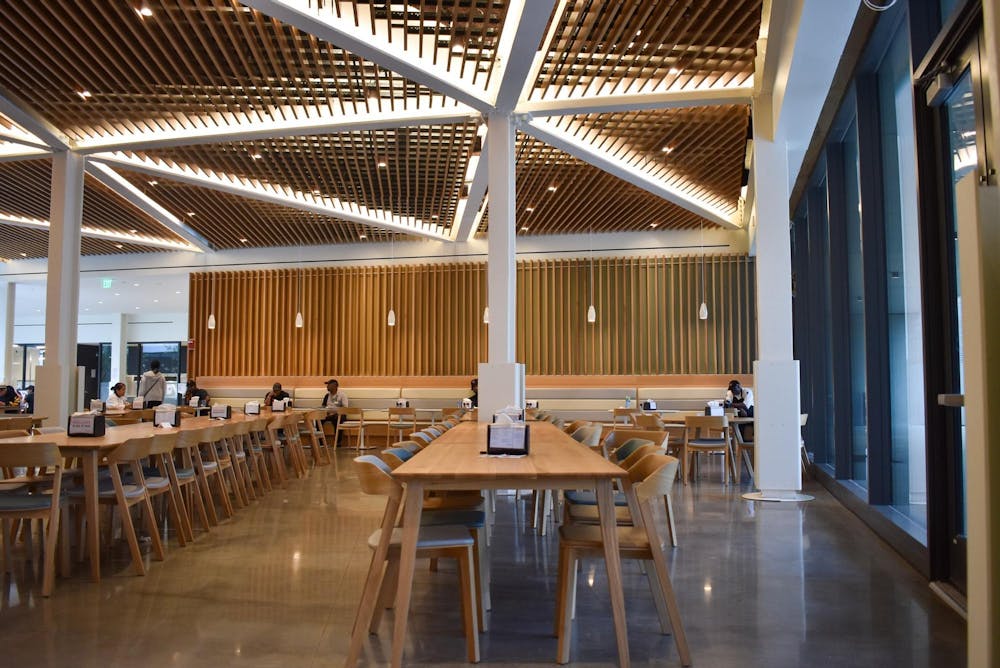The University’s decision to require the purchase of an upperclass student meal plan for students living on campus, effectively eliminating the “independent” dining option, could force one of five rising seniors to reconsider their dining option, if The Daily Princetonian’s past four Senior Surveys are any indication.
Each year, the ‘Prince’ surveys the outgoing senior class on a variety of topics surrounding campus life, demographics, and individual views. A few questions on the surveys pertain to which dining plan the respondent is a part of and their dining satisfaction.
Since the inaugural ‘Prince’ Senior Survey in April 2022, over 2,000 seniors from the Classes of 2022, 2023, 2024, and 2025 have responded to the question, “What is your current dining plan?” Of these respondents, 1,978 selected a single answer. For this analysis, data points where seniors selected multiple options were omitted, as the survey question was changed from a multi-select to a single select for the Class of 2025.
In this aggregate population, 19.7 percent of respondents reported that they were independent for their senior year dining plan — following eating clubs, the second most popular meal option among survey respondents.
With the new requirement to select a meal plan — even if part of an eating club or co-op — all students living on-campus will be on some form of University dining plan starting in the Fall 2026 semester.
Members of both co-op and eating club communities have raised concerns about the increased costs of having to enroll in a University dining plan in addition to paying their co-op or eating club. The ‘Prince’ estimates this change could cost co-op and eating club members an additional $515 per semester. Eating club and co-op members represent 63 percent and almost 6 percent of survey respondents, respectively.

The dining plan changes follow a 2024 study conducted by the Huron Consulting Group. One of Huron’s main findings from said study included that more than 25 percent of undergraduate students are not satisfied with their dining options. This study was directly cited in the email sent out to the Classes of 2027 and 2028 announcing the changes.
In the senior survey, out of the 2,106 student respondents who responded to the question, “How satisfied are you with your current dining plan?”, 9.3 percent selected “neutral,” “somewhat dissatisfied,” or “dissatisfied.” An additional 19 percent selected “somewhat satisfied.”
Students who were members of co-ops and eating clubs were more satisfied than students belonging to the dining plan or “independent” students in both the Senior Surveys and the Huron study.

While the Huron study does not break down satisfaction by dining plan, 66.2 percent of “independent” students selected “satisfied” on the Senior Surveys, which was the highest option presented to them.
Independent students ranked third in percent satisfied, behind eating club and co-op members at around 75 and 88 percent respectively. Students on the University meal plan options — whether partial, unlimited, or on the University plan in some capacity before the survey question changed — had the lowest proportions of satisfaction.
In their report, Huron mentioned that the group of students that were not satisfied “disproportionately represents the groups that Princeton hopes to attract and support.” The report references minority groups and those with accessibility needs on the same slide.
Around 77 percent of “independent” students receive some form of aid from the University, compared to the around 62 percent of the larger student body. Notably, the highest percentage — around 92 percent — of those on a partial University meal plan receive some form of aid from the University.
With the addition of this new policy, Director of Undergraduate Financial Aid Liz Badger noted that some students will see reductions to their financial aid refunds. The email announcing the new dining policy stated that the Block 32 (two meals per week) and Block 160 (10 meals per week) plans would be “consistent with per-meal pricing of current meal plans,” meaning that students currently on the only partial plan allowed — the Block 105 plan (around 6–7 meals a week) — could pay approximately $1,770 more for the partial-plan equivalent next year.
Besides the study conducted by the Huron Consulting Group, the University cites “several studies and pilots” that were conducted over recent years that helped guide this decision. In Spring 2023, the University conducted a dining pilot program in which a random selection of upperclass students were given an additional five free flexible meals that they could use at any of the food options on campus, including eating clubs and late meal.
According to the University’s post-pilot survey, almost three quarters of participants indicated that the pilot had a “positive or strongly positive impact on their sense of community,” and 85.7 percent indicated that they were “extremely satisfied” or “somewhat satisfied” with the program.
If the Spring 2023 pilot had been implemented, the ‘Prince’ previously estimated that students would have had to pay an extra $1,500 in dining costs.
With the officially enacted new dining plan, students will have fewer dining plan options and could pay between an additional $1,030 and $5,150 in dining costs to the University, depending on their block dining plan choice and their current dining plan.
The email also reads that these studies have “consistently shown” that student satisfaction drops after sophomore year “due to a disruption of community” that was built upon “dining habits” created in a student’s freshman and sophomore year, asserting a causal relationship between the move to various upperclass dining options and a negative residential experience.
Unlike the Spring 2023 pilot, the University has not yet released a report or the survey data involved in determining the relationship.
There are information sessions to address questions on the new dining options on Tuesday, Oct. 7 at 1 p.m. in McCosh 64 and Wednesday, Oct. 8 at 6:30 p.m. in Frist Multipurpose Room C.
Vincent Etherton is a head Data editor for the ‘Prince.’
Alexa Wingate contributed reporting.
Please send any corrections to corrections[at]dailyprincetonian.com.








